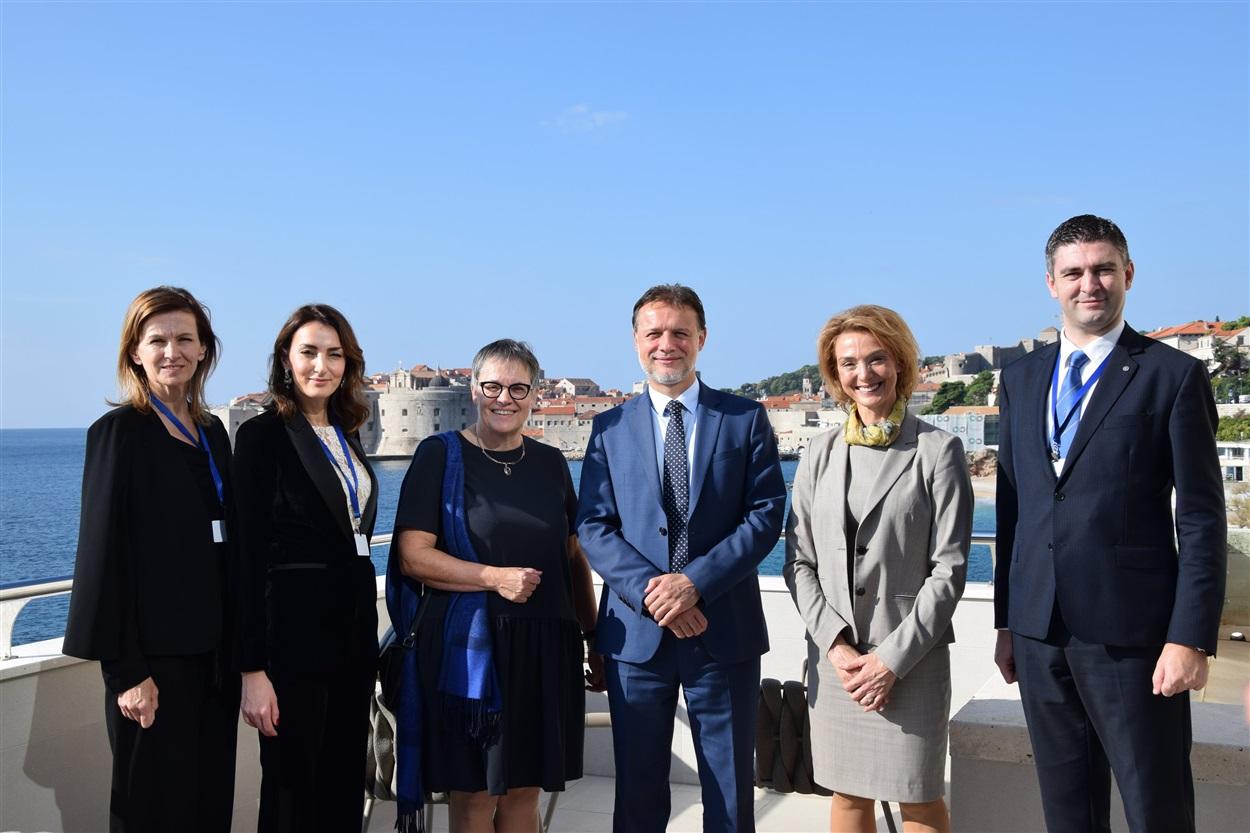
Dubrovnik – The International Parliamentary Conference “Building democratic security in the Mediterranean: common challenges, shared responsibility” was held on Tuesday as part of Croatia’s Chairmanship of the Council of Europe Committee of Ministers, organized by the Committee on Political Affairs and Democracy of the Parliamentary Assembly of the Council of Europe (PACE) and the Croatian Parliament.
Involved in the work of the Conference were the Speaker of Croatian Parliament Mr Gordan Jandroković, Deputy Prime Minister and Minister of Foreign and European Affairs Ms Pejčinović-Burić, Head of the Delegation of the Croatian Parliament to the PACE Ms Sanja Putica, President of the Parliamentary Assembly of the Council of Europe Ms Liliane Maury Pasquier, Deputy Secretary General of the Council of Europe Ms Gabriella Battaini-Dragoni, President of the Venice Commission Mr Gianni Buquicchio and many other guests.
The participants of the Conference, parliamentarians from the Council of Europe member states and parliamentarians from the countries of the MENA region (Middle East and North Africa), gathered in Dubrovnik to discuss various political and security challenges of the Mediterranean region, democratic security, promoting good governance and fight against all threats to the rule of law in that region, and to share their experiences.
In his opening address Speaker of Croatian Parliament Jandroković especially highlighted Croatia’s readiness for cooperation and sharing experience, since Croatia has demonstrated that the transformation towards democratic security and enjoying the company of most developed countries can be achieved within a relatively short period. In addition, he said that even before we became member of the European Union we had been politically supporting the idea of strengthening the ties between Mediterranean countries, first through the Barcelona Process and later the Union for the Mediterranean. - I welcome the Council’s unique approach and its programmes designed to help all southern Mediterranean countries strengthen democratic governance, said Jandroković.
The Chair of the Council of Europe Committee of Ministers, Deputy Prime Minister and minister Pejčinović-Burić said that establishing democratic security is a long-term process and that all challenges facing the countries of the Mediterranean can be addressed jointly through cooperation and partnership of the Council of Europe member states. – Only together can we respond to all security challenges in the Mediterranean and thus ensure for the people living there the future they deserve, the future we all deserve, Pejčinović-Burić said.
President of PACE Pasquier stated in her opening remarks that there was no single universal model of democracy, but that it was in everyone’s interest to advocate democratic security, strengthening of institutions, rule of law, human rights protection and other values and ideas which are conducive to peace, stability and security. – Through dialogue and inter-parliamentary cooperation, by seeking common solutions and assuming joint responsibility and by sharing experiences and good practices we can achieve a lot, Pasquier said.
During the first Session on the challenges to the stability in the Mediterranean the discussion was centred around how to respond to a number of challenges, including combating terrorism, migration crisis management and human rights protection, and how to find solutions to ensure peace and prosperity for all Mediterranean countries. The participants agreed that despite the many threats in the Mediterranean there is a need for joint action in preserving peace and stability, because the security of Europe also depends on the security of its neighbouring countries.
One of the topics of the second Session was Building democratic security, promoting good governance and countering threats to the rule of law. Deputy Secretary General of the Council of Europe Battaini-Dragoni presented the contribution of her organisation to addressing the challenges threatening the Mediterranean region through the concept of democratic security, comprising judicial independence, freedom of expression, freedom of assembly and association, functional democratic institutions, fight against corruption and building an inclusive society and democratic citizenship.
In her address on the topic Partnership for democracy with the Parliamentary Assembly as a platform for inter-parliamentary cooperation Pasquier especially emphasized that this model of cooperation was an efficient and flexible one. Pasquier presented examples of successful cooperation with the Maghreb countries that is well-established and said that the cooperation aimed at strengthening democratic security had intensified after the Arab Spring in 2011. – Partnership for democracy is based on universal values; democracy, rule of law, human rights protection and fundamental freedoms, which are equal both for the northern and the southern coasts of the Mediterranean, Paquier said.
The remaining part of the session was dedicated to the cooperation between the Council of Europe, the Group of States against Corruption (GRECO), the Council of Europe Counter-Terrorism Committee (CDCT) and the Venetian Commission and their joint contribution and tools for establishing stability in the Mediterranean. A particular contribution to the discussion was made by the representative of parliaments of countries of the MENA region, who addressed the challenges and efforts, but also the success in achieving and maintaining democratic standards in the countries they represent.

.png)














